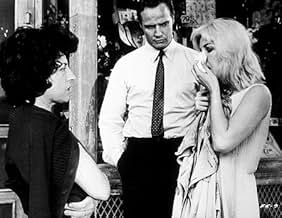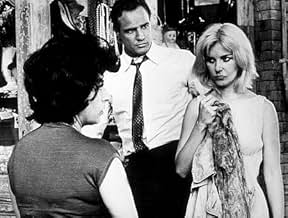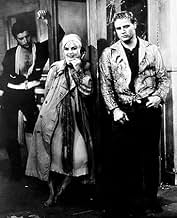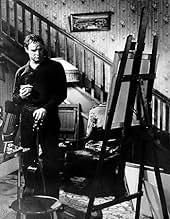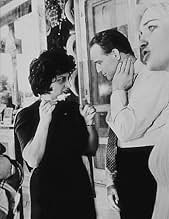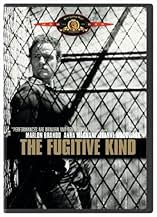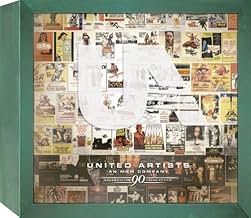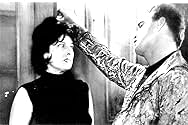IMDb RATING
7.1/10
7.8K
YOUR RATING
A guitar-playing drifter wanders into a small Mississippi town and inflames two troubled women.A guitar-playing drifter wanders into a small Mississippi town and inflames two troubled women.A guitar-playing drifter wanders into a small Mississippi town and inflames two troubled women.
- Awards
- 2 wins total
Madame Spivy
- Ruby Lightfoot
- (as Spivy)
Jeanne Barr
- Bit Part
- (uncredited)
Featured reviews
This is not a well-written film, but the acting is phenomenal. Brando and Magnani have really great chemistry and that's what carries the film. It is the acting of these two that make me want to watch this film time and time again. I didn't necessarily like Joanne Woodward in her role, it just didn't seem to fit her. It seemed like she was trying too hard or something, so I just tuned her out. But I was always tuned into Brando--its just something about him that just pulls you in--wondering what he'll do next in the scene. Anyway, The cinematography is great and adds to the moodiness of the film. Overall, the movie isn't necessarily Brando's greatest film, but it's by no means one of his worst. Unfortunately, there wasn't much to work with as far as the script, so the acting had to carry the film.
The Fugitive Kind is a hot story of desire and loss and craving and heartbreak between a man and two women set in the deep south. Sounds like quintessential Tenessee Williams, and it is in spurts. Sometimes Williams leans towards being a little preachy, however true (little moments like when Brando and Stapleton have a quiet back and forth about racism via her painting kind of nails it on the head much), but it's his skills at doing melodrama that strike up the coolest beats. In fact, this is one of those super-cool movies of the late 50s that could have only starred someone like Brando, who looks at times disinterested in the scene but at the same time completely engaged, curious, smooth, harsh, and knowing of what life can bring with his trusty Ledbelly-signed guitar. It's not necessarily a towering work for the ages ala Williams collaboration 1 Streetcar Named Desire. But that doesn't mean it should be much under-looked either.
As an early effort for Lumet it's also a scorcher dramatically; he's so good with the actors that whatever little missteps the script might take in pouring on the poetic prose in how some of the characters talk (there's a scene between Brando and Anna Magnani's characters by some ruin of a spot where she says people used to make love that is actually quite boring) can be usually forgiven. Magnani especially is interesting because she should be a case of miscasting, which, apparently in later years, Lumet admitted to. She seems low-key at first, but her strengths bloom out tenfold when it comes time to act like the hard-knock-life kind of woman she is, who's in a crap marriage and had a horrible affair with a man who didn't do anything after the summer they spent together. Now she's put into a situation where she does and doesn't want this drifter, and vice versa, and she's sometimes just as cool (though also quite tough and demanding in that big Italian mama way) as her counterpart.
Meanwhile there's also Joanne Woodard, who has the kind of part many actresses love to chew on; feisty, outspoken, loud but also emotionally moody to the point that she admirably tries (and doesn't quite get to) the heights of Vivien Leigh with her classic Blanche Dubois. Overall, Lumet gets a good feel for the period- and shot in New York state no less- while working with good material and an even better cast. It won't ever be as revered as his other work, and at the same time it's much better than some would give it credit for, where the tragedy acts like another sweaty Southern caricature bemoaning existence and fitting on a bad pair of shoes.
As an early effort for Lumet it's also a scorcher dramatically; he's so good with the actors that whatever little missteps the script might take in pouring on the poetic prose in how some of the characters talk (there's a scene between Brando and Anna Magnani's characters by some ruin of a spot where she says people used to make love that is actually quite boring) can be usually forgiven. Magnani especially is interesting because she should be a case of miscasting, which, apparently in later years, Lumet admitted to. She seems low-key at first, but her strengths bloom out tenfold when it comes time to act like the hard-knock-life kind of woman she is, who's in a crap marriage and had a horrible affair with a man who didn't do anything after the summer they spent together. Now she's put into a situation where she does and doesn't want this drifter, and vice versa, and she's sometimes just as cool (though also quite tough and demanding in that big Italian mama way) as her counterpart.
Meanwhile there's also Joanne Woodard, who has the kind of part many actresses love to chew on; feisty, outspoken, loud but also emotionally moody to the point that she admirably tries (and doesn't quite get to) the heights of Vivien Leigh with her classic Blanche Dubois. Overall, Lumet gets a good feel for the period- and shot in New York state no less- while working with good material and an even better cast. It won't ever be as revered as his other work, and at the same time it's much better than some would give it credit for, where the tragedy acts like another sweaty Southern caricature bemoaning existence and fitting on a bad pair of shoes.
Released in 1960 and directed by Sidney Lumet from Tennessee Williams' screenplay, "The Fugitive Kind" is a B&W southern Gothic drama starring Marlon Brando as loner minstrel Val "Snakeskin" from New Orleans in pursuit of a new life and the people with whom to live it. He stumbles upon a Mississippi town and gets a job at a mercantile store, which is run by a lonely passed-her-prime woman, Lady (Anna Magnani). While Snakeskin works the store downstairs, Lady's terminally ill husband is bedridden upstairs (Victor Jory). Joanne Woodward plays a histrionic beatnik while Maureen Stapleton is on hand as a housewife enamored by Snakeskin. R.G. Armstrong appears as the redneck sheriff.
The first time I watched this movie (in 2008) I didn't much like it, probably because I wasn't familiar with Williams' stagey, melodramatic style of writing. However, after just viewing Williams' "The Night of the Iguana" (1964) and really appreciating it, I had a taste for more and so gave "The Fugitive Kind" a second chance. I'm glad I did because, this time, I was able to discern its highlights and got a lot more out of it.
Marlon was in the midst of my favorite period of his career while filming this movie. Arguably his greatest films, "The Young Lions" (1958), "One-Eyed Jacks" (1961) and "Mutiny on the Bounty" (1962), were all shot during this time. While "The Fugitive Kind" is easily the least of these it's worth checking out for a number of reasons, as long as you're in the mood for a talky adult melodrama. Like "The Night of the Iguana," this is a brooding rumination on the nature of existence. As such, there are numerous treasures to glean from the seemingly interminable dialogues. The movie's overlong and could've been tightened up, but the interspersed riches hidden within make it worth staying with, but you have to be a seasoned adult to appreciate it or, at least, mature for your years.
Woodward's beatnik character is interesting as she's basically a hippie before hippies existed. Although her character is histrionic and somewhat annoying, some of her reflections are poignant, like in the interesting cemetery scene with Snakeskin. Emory Richardson is almost fascinating as Carol's silent black friend in a racist community. Some of their platonic imagery together is unexpected and intriguing for a film shot in 1959.
Brando was 35 during filming and became the first actor to make $1 million for a single film (although Elizabeth Taylor earlier signed a $1 million contract for "Cleopatra," that movie wasn't released until 1963). Magnani was 51 and hot to sleep with the star, but Marlon didn't find her attractive which, needless to say, negatively affected the shoot. This is surprising because some of their scenes together are quite good. I incidentally had an Italian neighbor who passed away six weeks ago who was strikingly reminiscent of Magnani's character, both looks-wise and temperament-wise. So I know firsthand that people like her exist.
The film runs 119 minutes and was shot in Milton, New York.
GRADE: B
The first time I watched this movie (in 2008) I didn't much like it, probably because I wasn't familiar with Williams' stagey, melodramatic style of writing. However, after just viewing Williams' "The Night of the Iguana" (1964) and really appreciating it, I had a taste for more and so gave "The Fugitive Kind" a second chance. I'm glad I did because, this time, I was able to discern its highlights and got a lot more out of it.
Marlon was in the midst of my favorite period of his career while filming this movie. Arguably his greatest films, "The Young Lions" (1958), "One-Eyed Jacks" (1961) and "Mutiny on the Bounty" (1962), were all shot during this time. While "The Fugitive Kind" is easily the least of these it's worth checking out for a number of reasons, as long as you're in the mood for a talky adult melodrama. Like "The Night of the Iguana," this is a brooding rumination on the nature of existence. As such, there are numerous treasures to glean from the seemingly interminable dialogues. The movie's overlong and could've been tightened up, but the interspersed riches hidden within make it worth staying with, but you have to be a seasoned adult to appreciate it or, at least, mature for your years.
Woodward's beatnik character is interesting as she's basically a hippie before hippies existed. Although her character is histrionic and somewhat annoying, some of her reflections are poignant, like in the interesting cemetery scene with Snakeskin. Emory Richardson is almost fascinating as Carol's silent black friend in a racist community. Some of their platonic imagery together is unexpected and intriguing for a film shot in 1959.
Brando was 35 during filming and became the first actor to make $1 million for a single film (although Elizabeth Taylor earlier signed a $1 million contract for "Cleopatra," that movie wasn't released until 1963). Magnani was 51 and hot to sleep with the star, but Marlon didn't find her attractive which, needless to say, negatively affected the shoot. This is surprising because some of their scenes together are quite good. I incidentally had an Italian neighbor who passed away six weeks ago who was strikingly reminiscent of Magnani's character, both looks-wise and temperament-wise. So I know firsthand that people like her exist.
The film runs 119 minutes and was shot in Milton, New York.
GRADE: B
Tennessee Williams was a stunning writer for the theater... The impact of his plays can overwhelm an audience with its superior force...
Written in 1957, "Orpheus Descending" is a reconstruction of Williams' 1940 "Battle of Angels," filmed under Sidney Lumet's direction as "The Fugitive Kind."
Williams subtracted elements of the ancient myth of Orpheus and Euridice to examine the sadistically patriarchal Southern Gothic town and to create a violent plot, involving ruined love, weakness, sex, betrayal, vengeance and lingering hatreds... "Orpheus Descending" shows how social prejudice threatens the lives of identified outsiders...
This classic play is not quite his masterpiece... "A Streetcar Named Desire" is... It lacks some of the regretful charm of "The Glass Menagerie" and the entire impact of "Cat On a Hot Tin Roof." Nevertheless it is a deeply moving work of art...
Williams was known for his compelling dialog and themes that - for their time - often seemed strange or shocking... He vividly suggested the sexual tensions and prevented violence of his tormented character, usually with compassion as well as irony...
The film focuses on a handsome drifter from New Orleans, named Val Xavier, wearing a snake skin jacket - Williams' trademark of a rebel, non-conformist - Val is a "fugitive kind" who comes in off the highway... He is a rural Orpheus who descends to rescue his love, not in Hades precisely, but among the intrigue, chatter, and violence of the hot-tempered town of Two Rivers, Mississippi... He is a wandering guitar player who embarks on an affair with a lonely frustrated unhappy storekeeper's wife Lady Torrance...
Anna Magnani is intelligently sensual and charming as Lady... Joanne Woodward is the hungry grotesque drunken Carol who tries to seduce Val in a cemetery... Both women are so intense, that they force you to become involved with them...
The genuine community provides also interesting watching: Victor Jory, positively magnetic as the brutal oppressive husband Jabe Torrence; the vindictive sheriff R. G. Armstrong; and the soft-hearted Vee (Maureen Stapleton).
Lady Torrence is a study of the immigrant woman who has acquired a patina of resilient toughness but who slowly admits her sensuality... She catches perfectly contradictory emotions of one who is wary of the stranger but who longs for his healing touch...
With handsome magnetism, Brando is no less compelling... He is quite convincing avoiding all the clichés of the drifting Don Juan... With some kind of lucid intensity, he mixes his character's predatory and uncivil arrogance with flashes of sweet tenderness...
The film (definitely worth seeing) is extremely poignant and captivating... The direction is excellent and the action moves very smoothly, never allowing you to relax...
Written in 1957, "Orpheus Descending" is a reconstruction of Williams' 1940 "Battle of Angels," filmed under Sidney Lumet's direction as "The Fugitive Kind."
Williams subtracted elements of the ancient myth of Orpheus and Euridice to examine the sadistically patriarchal Southern Gothic town and to create a violent plot, involving ruined love, weakness, sex, betrayal, vengeance and lingering hatreds... "Orpheus Descending" shows how social prejudice threatens the lives of identified outsiders...
This classic play is not quite his masterpiece... "A Streetcar Named Desire" is... It lacks some of the regretful charm of "The Glass Menagerie" and the entire impact of "Cat On a Hot Tin Roof." Nevertheless it is a deeply moving work of art...
Williams was known for his compelling dialog and themes that - for their time - often seemed strange or shocking... He vividly suggested the sexual tensions and prevented violence of his tormented character, usually with compassion as well as irony...
The film focuses on a handsome drifter from New Orleans, named Val Xavier, wearing a snake skin jacket - Williams' trademark of a rebel, non-conformist - Val is a "fugitive kind" who comes in off the highway... He is a rural Orpheus who descends to rescue his love, not in Hades precisely, but among the intrigue, chatter, and violence of the hot-tempered town of Two Rivers, Mississippi... He is a wandering guitar player who embarks on an affair with a lonely frustrated unhappy storekeeper's wife Lady Torrance...
Anna Magnani is intelligently sensual and charming as Lady... Joanne Woodward is the hungry grotesque drunken Carol who tries to seduce Val in a cemetery... Both women are so intense, that they force you to become involved with them...
The genuine community provides also interesting watching: Victor Jory, positively magnetic as the brutal oppressive husband Jabe Torrence; the vindictive sheriff R. G. Armstrong; and the soft-hearted Vee (Maureen Stapleton).
Lady Torrence is a study of the immigrant woman who has acquired a patina of resilient toughness but who slowly admits her sensuality... She catches perfectly contradictory emotions of one who is wary of the stranger but who longs for his healing touch...
With handsome magnetism, Brando is no less compelling... He is quite convincing avoiding all the clichés of the drifting Don Juan... With some kind of lucid intensity, he mixes his character's predatory and uncivil arrogance with flashes of sweet tenderness...
The film (definitely worth seeing) is extremely poignant and captivating... The direction is excellent and the action moves very smoothly, never allowing you to relax...
It's set in smalltown Mississippi in the 1950s and follows a down-and-out character who is trying to turn his life around and the doomed relationships into which he stumbles.
Valentine Xavier (Marlon Brando), also know as Snakeskin because of the snakeskin jacket he wears, gets out of jail in New Orleans and hits the road. His car breaks down in the middle of a rainstorm in a little Mississippi town, so he stops and gets a job in a little mercantile store run by Lady Torrance (Anna Magnani). She's lonely and has an older sick husband, Jabe (Victor Jory), who doesn't trust her or the good-looking clerk she just hired, especially when she fixes up a little bedroom for Xavier in the back of the store.
Lady Torrance gets some competition from a young rich woman, Carol (Joanne Woodward), who is often drunk and remembers Xavier from New Orleans. She's too over the top to be real competition for Lady Torrence, however.
After Lady Torrence learns her husband was among an earlier group of vigilantes that burned down her father's vineyards and home with her father inside, she is determined to open a "confectionary" attached to the mercantile store, that is designed like a vineyard. She wants Jabe to see before she allows him to die.
However, there is a conflagration at the end that unhappily resolves the plot.
This is Tennessee Williams with his grimiest southern town filled with malfunctioning human relationships. There are only dim flares of hope throughout, only to be extinguished by the end. Marlon Brando, as one reviewer put it, is "an astonishing physical specimen, a statuesque hunk with the intellectual ennui of a philosopher, who moves with a panther-like ease" and is "the misfit we all want to be." Anna Magnani is the earthy older woman who is finally trying to grasp some joy from life. They are a potent combination, though I sometimes find Tennessee Williams' words to be overwrought.
Valentine Xavier (Marlon Brando), also know as Snakeskin because of the snakeskin jacket he wears, gets out of jail in New Orleans and hits the road. His car breaks down in the middle of a rainstorm in a little Mississippi town, so he stops and gets a job in a little mercantile store run by Lady Torrance (Anna Magnani). She's lonely and has an older sick husband, Jabe (Victor Jory), who doesn't trust her or the good-looking clerk she just hired, especially when she fixes up a little bedroom for Xavier in the back of the store.
Lady Torrance gets some competition from a young rich woman, Carol (Joanne Woodward), who is often drunk and remembers Xavier from New Orleans. She's too over the top to be real competition for Lady Torrence, however.
After Lady Torrence learns her husband was among an earlier group of vigilantes that burned down her father's vineyards and home with her father inside, she is determined to open a "confectionary" attached to the mercantile store, that is designed like a vineyard. She wants Jabe to see before she allows him to die.
However, there is a conflagration at the end that unhappily resolves the plot.
This is Tennessee Williams with his grimiest southern town filled with malfunctioning human relationships. There are only dim flares of hope throughout, only to be extinguished by the end. Marlon Brando, as one reviewer put it, is "an astonishing physical specimen, a statuesque hunk with the intellectual ennui of a philosopher, who moves with a panther-like ease" and is "the misfit we all want to be." Anna Magnani is the earthy older woman who is finally trying to grasp some joy from life. They are a potent combination, though I sometimes find Tennessee Williams' words to be overwrought.
Did you know
- TriviaMarlon Brando described Anna Magnani as being equally fiery and passionate off screen. He claimed she made a pass at him in a hotel before filming began.
- GoofsAt the cemetery, Xavier returns to the car and turns on its headlights. A much brighter studio light comes on a beat too late to further illuminate the right side of the frame.
- Quotes
Lady Torrance: Tell me some more about your self-control.
Valentine Xavier: Well, they say that a woman can burn a man down, you know? But I can burn a woman down. I'm saying that I could. I'm not saying I would.
Lady Torrance: What's the matter? Have they tired you out?
Valentine Xavier: No, I'm not tired.
- How long is The Fugitive Kind?Powered by Alexa
Details
- Release date
- Country of origin
- Language
- Also known as
- El hombre de la piel de víbora
- Filming locations
- Production company
- See more company credits at IMDbPro
Box office
- Budget
- $2,000,000 (estimated)
- Runtime1 hour 59 minutes
- Color
- Aspect ratio
- 1.66 : 1
Contribute to this page
Suggest an edit or add missing content



